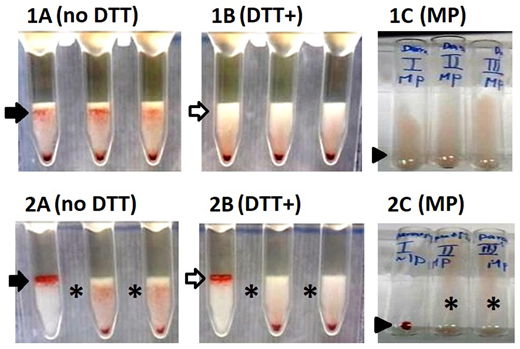Abstract
Background: Daratumumab, a monoclonal antibody against human CD38, is an effective treatment for patients with multiple myeloma and has been licensed for this indication worldwide. Some other anti-CD38 monoclonal antibodies, such as Isatuximab, are now under active development. A major concern of anti-CD38 monoclonal antibody treatment is the interference on blood compatibility test. Treating reagent erythrocytes with dithiothreitol (DTT) to denature surface CD38 is a robust method to mitigate this interference and this method has been validated internationally (Transfusion, 2016;56;2964-2972). However, the distribution of common alloreactive antibodies differed widely between Asian and Caucasian population. While column agglutination technology (CAT) is widely used in the western countries because of a much higher sensitivity in detecting Anti-K comparing to manual polybrene (MP) test, MP has a higher sensitivity in detecting anti-E, which is either the most common or frequently detected alloreactive antibody in Asia countries, including China, Taiwan, Korea, Japan, India, Malaysia, and Thai. Furthermore, Anti-K is extremely rare in Asian population. It is therefore MP is still widely used at most medical centers in Taiwan. Nevertheless, the interference of Anti-CD38 on MP test is unknown.
Methods: Per hospital guideline, all the patients planning to receive anti-CD38 monoclonal antibody treatment should have complete blood group typing and antibody screening prior to and after anti-CD38 treatment. Consecutive 11 patients receiving Daratumumab (N=7) and Isatuximab (N=4) at China Medical University Hospital were included in this study. Direct antiglobulin test (DAT), indirect antiglobulin test (IAT), and antibody screening tests (using MP, tube-CAT, and gel-CAT) were done before and after anti-CD38 treatment. In addition, repeat tube/gel-CAT with DTT-treated reagent erythrocytes (DTT-CAT) were done on blood specimens collected after anti-CD38 treatment. Since no alloantibody was detected in these patients, standard anti-E test serum was added into a Daratumumab-treated patient's serum and MP and DTT-CAT were done to compare the ability of these 2 methods in detecting anti-E.
Results: Before the treatment of anti-CD38, alloreactive antibody was not detected in all the 11 patients. After anti-CD38 treatment, all the specimens of these patients showed pan-reactivity to the reagent erythrocytes (solid arrow of figure 1A as example) and DTT treatment mitigated this reaction (open arrow of figure 1B). Interestingly, all the specimens tested by MP showed no agglutination (solid arrowhead of figure 1C). Adding anti-E test serum into patient's serum and repeated the compatibility tests showed that a strong agglutination (solid arrow of figure 2A) on panel 1 erythrocytes (containing E+ RBC) and a weak agglutination on panel 2 and 3 erythrocytes (asterisks of figure 2A) by using CAT. With the DTT treatment, the strong agglutination on panel 1 erythrocytes persisted (open arrow of figure 2B) and the weak agglutination on panel 2 and 3 erythrocytes disappeared (asterisks of figure 2B). By using MP, the agglutination on panel 1 erythrocytes is very strong (solid arrowhead of figure 2C) and there was clearly no agglutination on panel 2 and 3 erythrocytes (asterisks of figure 2C). In addition, positive DAT was found in 2 patients after anti-CD38 treatment without clinical evidence of hemolysis.
Conclusion: Our study for the first time showed that Anti-CD38 monoclonal antibody treatment (both Daratumumab and Isatuximab) do NOT interfere with the blood compatibility test and do not jeopardize the ability of detecting anti-E by using manual polybrene. Since anti-E is the most common alloreactive antibody in Asian population and MP is more sensitive in detecting anti-E, MP is thus the preferred method for Asian patients who received anti-CD38 treatment. Furthermore, MP is also a viable alternative to DTT-CAT for blood bank when DTT is not readily available.
Yeh:GNT Biotech & Medicals Crop.: Research Funding.
Author notes
Asterisk with author names denotes non-ASH members.


This feature is available to Subscribers Only
Sign In or Create an Account Close Modal